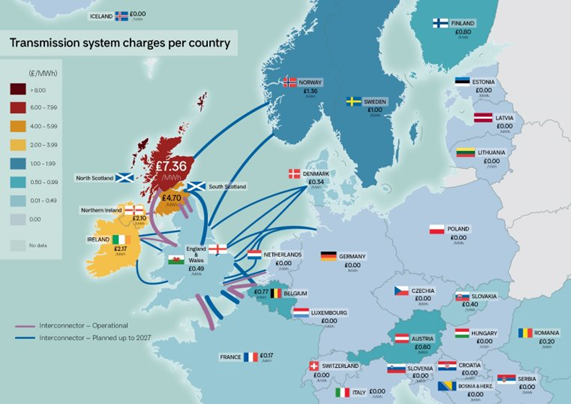New research published today shows that Britain’s energy regulators are putting billions of pounds of green infrastructure investment at risk by overseeing an energy market which favours EU energy imports at the expense of home-grown schemes.

Electricity generators in the UK pay transmission charges for the cost of building and maintaining the network, set by the regulator Ofgem and ultimately paid by consumers as part of their bills.
New analysis by RIDG (Renewable Infrastructure Development Group), a member company of RenewableUK, highlights the stark anomalies in how electricity generators access the GB market – with operators in Germany, France and the Netherlands able to export energy significantly cheaper than projects in the UK, because they pay very low transmission charges, or none at all.
As a result, the UK risks becoming a net importer of renewable energy in the decades ahead, despite having the best wind energy resource in Europe which should, with the right regulations in place, be used to drive export-led growth.
Although the Prime Minister is focussed on levelling up economic opportunities for all parts of the country in a Green Industrial Revolution, this analysis shows how Ofgem is overseeing a system which favours investment in the south of England and the EU.
The analysis shows that on average, EU generators pay £0.46 per megawatt hour (MWh) in transmission system charges, while in Scotland the average this year is £6.42/MWh. Move to the windy north of Scotland and the price spikes to £7.36/MWh, with prices forecast to rise further still.
Commenting on the report, RenewableUK’s Director of Future Electricity Systems Barnaby Wharton said:
“The UK has the best wind resource in Europe, and we should be making the most of the clean electricity we’re producing for UK consumers at the lowest cost and ensuring we can export the massive amount of power we’re generating when there’s a surplus.
“The current approach to transmission grid charging is not sustainable if we want global Britain to become a bigger player in the international power market. If Ofgem is serious about supporting UK’s net zero emissions target, it should change its approach to ensure we can take advantage of the bountiful natural resources we have. Ofgem needs to have a specific net zero remit to ensure we maximise our zero carbon generation as a matter of urgency - and this should be addressed by Ministers alongside the Government’s forthcoming Strategy and Policy Statement for Ofgem.”
The author of the research, Associate Director of RIDG Marc Smeed, said:
“Of 36 countries in the European transmission network, 20 do not charge generators at all and only five levy charges based on location. Compare this to Scottish offshore wind projects, which our analysis forecasts will pay £10/MWh – around a quarter of a project’s revenue – to access the grid in the years ahead.
“Addressing this imbalance would help unlock the best wind energy resources in Europe, bringing billions of pounds of investment and jobs to some of the most remote and disadvantaged parts of the UK.”
KeyFacts Energy Industry Directory: RenewableUK
 KEYFACT Energy
KEYFACT Energy